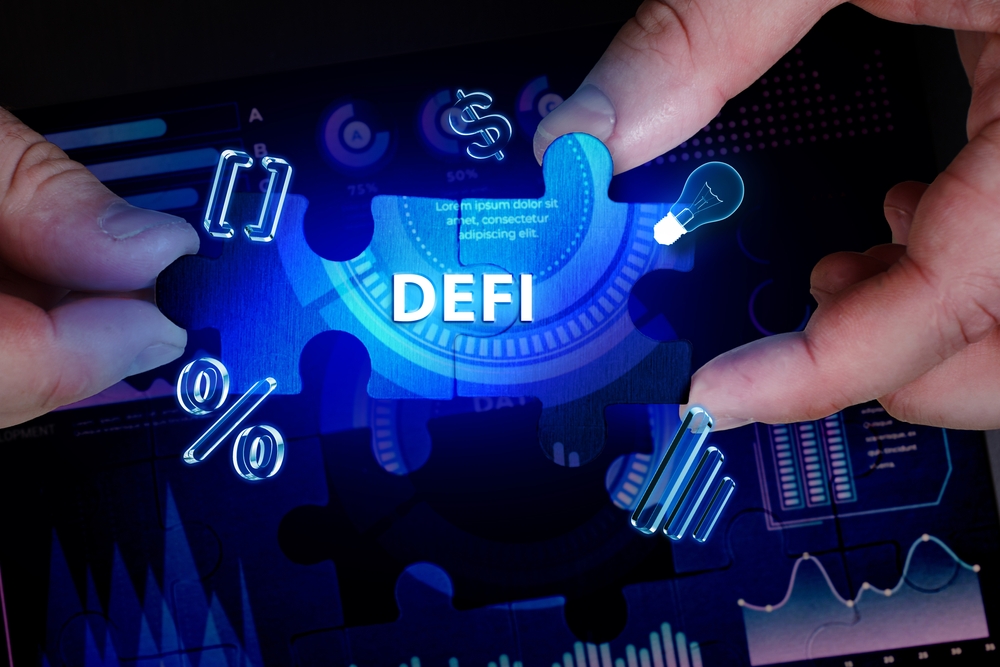DeFI development
The Shift from Traditional Business Models to DeFi Innovation
Are you struggling with issues like delayed settlement cycles, inefficient price discovery, liquidity challenges, poor decision-making, and uncertainty around underlying assets caused by traditional finance methods? Decentralized Finance (DeFi) development can resolve these problems.
Whether you're a unicorn startup or a Fortune 500 company, DeFi blockchain development can decentralize your future. From enhanced stakeholder control and lightning-fast settlements to improved auditability and reduced counterparty risks, the services of a DeFi development company offer immense potential for emerging businesses, propelling them to new heights.
DeFi Development
Global Market Size of Decentralized Finance Development
At Shivacha, we are constantly focused on the future of the digital world, and that future is fully decentralized. The global decentralized finance market was valued at USD 13.61 billion in 2022 and is projected to grow at a CAGR of 46.0% from 2023 to 2030.
As the DeFi platform development landscape continues to evolve, both traditional financial institutions and new market entrants can leverage DeFi development solutions to drive success in their businesses.
- Shivacha technology Plot 23, Sector 18, Gurugram, Haryana 122015
- [email protected]
- +91-8171133917




Leading DeFi Development Firm with a Results-Driven Approach
Whether you’re looking to develop a public, private, or hybrid blockchain solution, or aiming to kickstart seamless DeFi smart contract development, Shivacha stands as a top-tier DeFi development company offering reliable, robust, and scalable solutions to clients worldwide. With over 500 successful projects delivered globally, Shivacha has established itself as a leader in DeFi token development.
Shivacha’s vision as the best DeFi development company is clear: to create intuitive, robust, user-friendly, scalable, and aesthetically appealing blockchain solutions that meet today’s needs and anticipate the future. We adopt an agile methodology, backed by a team of certified experts skilled in understanding and delivering what modern and potential customers demand from blockchain solutions.
Practical Advantages of DeFi Software Development
Streamlining the Process
DeFi minimizes dependence on intermediaries, allowing direct transactions between participants.
Automating the Process
Smart contracts empower organizations to automate and expedite their processes and services.
Lower Transaction Costs
Peer-to-peer transactions between participants help lower transaction costs.
Increased Control
Users' assets are kept in non-custodial wallets, offering enhanced autonomy and control over their assets, as shown in the informative charts and graphs.
Quicker Settlement
DeFi applications can dramatically shorten settlement time from T+1 to T+0, enabling instant transactions.
Enhanced Security
Blockchain architecture guarantees tamper-proof, secure, and auditable data, providing users with enhanced safety.
Liquidity
DeFi fosters financial inclusion by providing access to financial services for the underbanked and unbanked populations.
Driving Innovation
DeFi's open, permissionless, and programmable architecture allows the creation of financial services and instruments tailored to users' needs.
Enhanced Transparency
DeFi offers enhanced transparency by providing open, immutable records on the blockchain, ensuring all transactions are visible and verifiable.
Let's Turn Your DeFi Ideas into Reality and Lead the Future with Shivacha.
Experience excellence powered by next-gen technologies with our exceptional DeFi solutions. Explore our advanced DeFi development services to create innovative solutions.
Our defi SErvices
Experience excellence powered by next-gen technologies with our exceptional DeFi solutions. Explore our advanced DeFi development services to create innovative solutions.
Asset management
Asset management in DeFi development services refer to the practice of managing digital assets in a decentralized financial ecosystem. DeFi asset management can take many forms, like decentralized exchanges, yield farming, staking, lending, etc.
Data and Analytics
Analytics can assist DeFi platforms in recognizing patterns in user activity, boosting performance. By examining user behavior and transaction trends, developers can optimize infrastructure, accelerate transaction speed, and strengthen security.
DeFi exchanges
DeFi exchanges are a key application of DeFi development services, enabling users to trade cryptocurrencies and digital assets in a decentralized, cost-efficient, peer-to-peer way, without relying on intermediaries.
Gaming
Gaming, a growing facet of DeFi, merges blockchain technology's advantages with the excitement of traditional video games. Gaming DeFi development solutions have quickly gained popularity.
Stable coins
Stablecoins offer a stable medium of exchange and store of value, unaffected by the volatility of other cryptocurrencies. They are highly valuable for trading, lending, borrowing, and yield farming.
Synthetic assets
In DeFi development, synthetic assets are digital tokens that represent the value of real-world assets, such as stocks or financial instruments. They replicate the price movements and features of the underlying assets.
DeFi FAQ
Got a Question?
Find Answers to Your Questions
Decentralized Finance (DeFi) is a blockchain-powered financial system that functions without intermediaries like banks or brokers. By utilizing smart contracts, decentralized networks, and cryptocurrencies, DeFi provides transparent, secure, and accessible financial services such as lending, borrowing, trading, and savings.
Digital yield refers to the returns or profits generated from digital assets, typically through decentralized finance (DeFi) platforms. This can include interest earned from lending cryptocurrencies, rewards from staking, or profits from yield farming activities. Digital yield is a way for investors to earn passive income through their digital assets.
DeFi, or Decentralized Finance, originated from the rise of blockchain technology and the desire to create a financial system independent of traditional intermediaries like banks. Its roots can be traced back to Bitcoin, launched in 2009, which introduced decentralized digital currency. However, DeFi as we know it began to take shape in 2018 with the advent of Ethereum and its smart contract capabilities, enabling the creation of decentralized applications (dApps) and financial services on blockchain networks. This movement gained momentum as more platforms and projects emerged, offering peer-to-peer financial services.
Why is DeFi Often Compared to Fixed Income?
DeFi is often compared to fixed income because both offer opportunities for generating passive income through interest or rewards. In DeFi, users can earn yields by lending or staking their digital assets, similar to how fixed-income investments like bonds provide regular interest payments. While fixed income relies on traditional financial systems, DeFi operates on decentralized networks, offering higher yields and more flexibility, but also with increased risk. This comparison highlights DeFi’s potential to provide stable returns, similar to fixed income investments, but within the context of blockchain technology.
DeFi seeks to address the structural issues of centralized institutions by creating a decentralized network where individuals can freely innovate, collaborate, and transact. Users of DeFi have control over their funds through personal crypto wallets, bypassing banks or brokers. This approach offers greater efficiency and transparency in accessing financial services. For more details, read “My Bank Forced Me to Use DeFi.”
In DeFi, borrowing and lending operate through decentralized platforms without intermediaries like banks. Users can lend their digital assets to earn interest or borrow assets by providing collateral. Smart contracts automate these processes, ensuring secure, transparent, and trustless transactions. Lenders earn yields on their assets, while borrowers access funds with lower barriers, often with more flexible terms compared to traditional finance. Interest rates in DeFi are determined by supply and demand dynamics within the platform, offering greater flexibility and potential returns.
